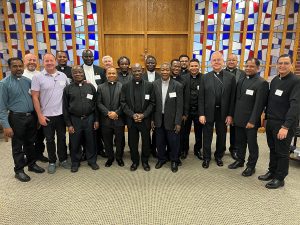SCRANTON – With international priests now making up a fifth of its active clergy, the Diocese of Scranton recently held a groundbreaking initiative aimed at fostering better integration and communication.
From July 15-17, 2024, international priests serving throughout the Diocese came together to participate in a specialized Acculturation and Accent workshop at the Diocesan Pastoral Center in Scranton.

The Most Rev. Joseph C. Bambera, Bishop of Scranton, welcomed nearly 20 international priests to the gathering – beginning with sincere gratitude for the sacrifice that each man is making – being so far away from home.
“I want to say thank you for your willingness to do that,” Bishop Bambera said. “We can’t do it without you, so thank you.”
The three-day workshop was led by Dr. Kevin Spence, who is associated with the Saint Meinrad Institute for Priests and Presbyterates. He held numerous hands-on sessions that included information on U.S. speech patterns, pronunciations, cultural differences and communication techniques.
“The workshop was very fruitful,” Father Neftali Feliz-Sena, Assistant Pastor at Annunciation Parish in Hazleton, said. “As international priests, we have our own culture and it is hard to deny what we are, but as we work in another culture, we need to have a better understanding of the other (American) culture.”
A native of Kerala, India, Father Jose Kuriappilly has been ministering in the Diocese of Scranton for five years. Currently serving as Pastor of Saints Peter & Paul Parish in Towanda and Our Lady of Perpetual Help Parish in Wyalusing, he said the workshop sessions helped him understand the American language on a deeper level, especially the pronunciation of some words.
“When I became a pastor, I talked to my people openly saying, ‘I am in a different world and everything is different for me – my language, culture, climate, food, everything is different – so you have to adjust with me and if you have any good opinions or corrections, please just come to me and correct me,’” Father Jose explained. “As I continue to practice, I grow in my language and the culture class
did help me a lot.”
Father Stephen Bosomafi, Pastor of Saint Thomas More Parish in Lake Ariel, found the discussion on differences in pastoral ministry in the United States fascinating.
“Some of the things were eye opening. There are things that sometimes we take for granted and now we are exposed and we know this is not what Americans expect from you,” Father Bosomafi explained. “The tendency is for anyone to say, ‘I want to do things my way,’ but you are here serving the needs of the people … you should meet them at a certain point.”
The three-day course also allowed the international priests to reflect on some of the biggest differences they have experienced between American culture and their homeland.
Expanding on the concept of freedom, Father Neftali said he is always shocked by how Americans leave Mass after the distribution of Holy Communion.
“We don’t do that in our culture. The Mass doesn’t end until the priest or deacon says, ‘The Mass is ended, go in peace,’” he said. “After communion, you might see half the church empty. That was shocking for me, seeing that reality.”
For Father Jose, socialization with parishioners – especially children – has caused him a little tension.
“Sometimes I notice, some kids after the Mass, they come and hug us, but I am afraid at times,” Father Jose explained, noting the importance of safe environment policies instituted in the United States. “You have to be careful.”
Feedback from the participating priests was overwhelmingly positive, many expressing appreciation for the program’s comprehensive approach.
The priests said the sessions show the Diocese of Scranton is committed to helping international priests fully engage with and serve their communities.
“I think that is something to be commended and we appreciate what the
Bishop is doing,” Father Stephen said.
“We appreciate the closeness, as well, from the priests of the Diocese and also from the Curia – the Bishop, Vicar General and Vicar for Clergy – they are so close and they show us respect and they are so grateful that we are here. That is very meaningful,” Father Neftali ended by saying.
